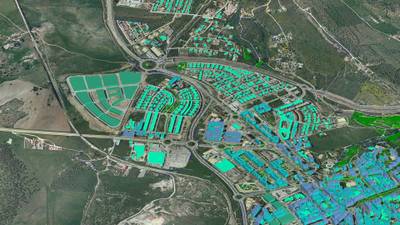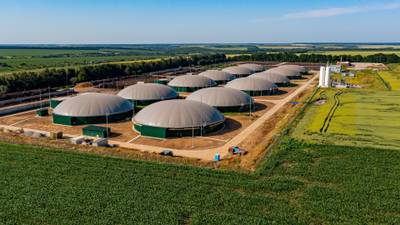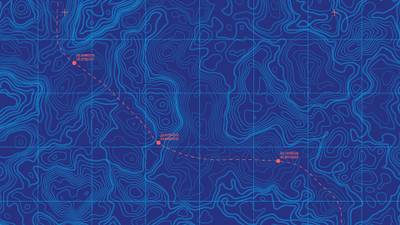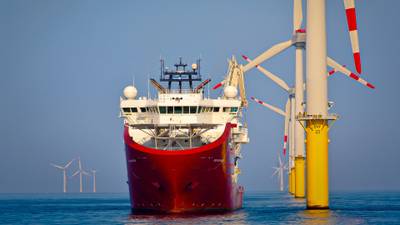Join the first online energy transition degree of its kind in the UK.
Prepare for an engineering career in the energy transition from fossil fuels to renewables.
Energy transitions require technical, economic, and social solutions to the complex challenges of decarbonisation.
In this online MSc in Energy Transition, you’ll develop a detailed understanding of these diverse challenges.
You’ll learn how we can integrate Low Carbon Technologies (LCTs) into current and future energy systems.
With guidance from University of Aberdeen academics, engineers, and industry professionals, you’ll gain in-depth technical knowledge of LCTs, including:
- wind
- tidal
- solar
- hydrogen
- and biomass.
More than engineering skills
You’ll also study the non-technical aspects that all engineers in this field need to address, covering the economics and politics of the energy transition.
You’ll take a systems-thinking approach to energy transition, to understand complex, interconnected, and increasingly digitalised energy systems.
You’ll train in a range of relevant methods for system-level analysis, including Geographical Information Systems (GIS) and Energy System Analysis (ESA). And you’ll learn to use technical, economic and environmental analysis tools to assess and compare different technologies.
Who can join online MSc Energy Transition?
This distance-learning degree is open to BSc and BEng engineering graduates, as well as graduates of other related disciplines in the physical sciences, natural sciences and mathematics.
You can learn online with us anywhere in the world, no student visa required.
You can also study this degree full-time on campus.
Choose the University of Aberdeen for your online energy transition degree

Fits around full-time work
This degree fits around full-time work, with flexible hours and 24/7 study access.

Train with energy transition experts
Learn with a university leading the way in renewables, carbon capture, fuel cells, digitalisation and more.

20% alumni discount
University of Aberdeen alumni receive 20% off fees for this online degree.
By the end of this degree, you’ll be able to...
-
Employ a detailed understanding of Low Carbon Technologies, including wind, tidal, solar, biomass and hydrogen energy.
-
Analyse and discuss the crucial non-technical aspects of energy transition, including economics, policy and politics.
-
Apply a systems-thinking approach to energy transition, critical to success given the complex and interconnected nature of today’s energy systems.
-
Pursue a career in energy transition, helping us progress towards a future powered by clean, affordable energy.
-
Evaluate and compare different energy transition technologies using system-level analysis, including Geographical Information Systems and Energy System Analysis.
What you’ll study
You can choose to study for a:
- Masters (180 credits)
- exit early with a Postgraduate Diploma (120 credits)
- exit early with a Postgraduate Certificate (60 credits), or
- start with one of the short courses that make up this degree (15 credits).
You can build your way to a qualification one short course at a time.
How you’ll study
Online learning
This distance learning MSc in Energy Transition Systems and Technologies is delivered flexibly online.
You can learn with us anywhere, no student visa required, and set your study hours to suit you.
Your teaching
Teaching is delivered through MyAberdeen, our online Virtual Learning Environment (VLE). It holds all the materials, tools and support you’ll need in your studies. Take a look around MyAberdeen.
You can access your learning materials on computer, smartphone and laptop, 24 hours a day. You’ll find a range of resources available, including online access to our award-winning Sir Duncan Rice Library.
Your tutors
You’ll learn from an international team of research-active engineering staff from our School of Engineering.
Your tutors include experts from our Centre for Energy Transition, who’ll share their knowledge, experience and ground-breaking research.
You’ll also learn from specialists in our School of Geosciences, School of Business, and School of Law.
Industry input
Our location at the heart of the energy industry means this energy transition degree benefits from direct involvement from UK energy companies, as well as from overseas.
This includes industry advisory panels to ensure your degree content is always current and informed by the latest industry needs and developments.
You’ll also enjoy guest lectures, online networking and careers events, and industry-supported student projects.
This degree is assessed online.
We’ll use a range of online assessment methods throughout your studies. These may include:
- written coursework
- online tests
- reports and projects.
Hours for taught courses
If you plan to study part-time, we recommend you take no more than 30 credits per term. Students typically take one or two 15-credit short courses per term.
15 credits
- Around 150 hours of study and assessment time to complete.
- You’ll study 8 – 10 hours per week per term, plus more at assessment times.
30 credits
- Around 300 hours of study and assessment time to complete.
- You’ll study 15 – 20 hours per week per term, plus more at assessment times.
You can also study this degree full-time. You can take a maximum of 60 credits per term.
60 credits
- Around 600 hours of study and assessment time to complete.
- You’ll study around 40 hours per week per term, plus more at assessment times.
This is an indicative guide to the time required for a typical student at this level to achieve the learning outcomes.
You can largely set your own study hours each week to cover the materials. MyAberdeen is available 24/7, so you can log in and study when it suits you.
Activities at fixed times
There will be some activities scheduled at a fixed time, such as online meetings with your tutor or assessments with deadlines. But otherwise, you can access and work through each course at your convenience.
Hours for 60-credit projects
A 60-credit project is around 600 hours of study time.
This is around one term of full-time study.
You can dedicate a full term to your project and work on it full-time. Or you can complete it part-time, spreading the hours you dedicate to it over two or more terms.
When you study with us, you can expect a first-class support structure so that you’re never alone in your studies.
But learning online does mean you have to motivate yourself and manage your own time.
Your most important commitment will be time – the time to work through, reflect on and understand your teaching materials.
Before you start a course that involves a high degree of independent study, we recommend looking at the time you will be able to devote to your studies each week:
- Be realistic
- Create a weekly schedule as a guide
If you have any questions about studying online, get in touch with our friendly team. We’re here to help.
Our first-class support structure will ensure that you aren’t alone in your studies. You’ll have contact with your tutors via MyAberdeen and email. You can use social media and discussion boards to chat with your fellow students too.
We provide a wide range of services to support you in your studies and beyond:
- Careers and Employability Service – including one-to-one advice sessions
- Disability support
- IT support
- Library support
- Student Support Service – help with finances, stress, wellbeing and non-academic issues
- Student Learning Service – study support, with advice sessions available via phone or Skype
- Aberdeen University Students’ Association (AUSA) – run by students for students
- Toolkit – clever apps and free training that can make your study life easier
Wherever you are in the world, you’ll feel part of our very special Aberdeen learning community.
We’re a member of the Access scheme run by the Society of College, National and University Libraries (SCONUL).
Access study spaces, books and journals in your area
The SCONUL Access scheme allows you, as a University of Aberdeen student, to access books and resources at university libraries across the UK and Ireland, or visit them for a quiet place to study.
You’ll be able to use study spaces, books and journals at over 150 university libraries which belong to the scheme.
Your support team
Our friendly team are here to answer any queries you have before, during and after your studies.

Dr Alfonso Martinez-Felipe
Alfonso is the degree coordinator. He’ll be on hand to answer any questions about degree content before you start and to help you throughout your studies.

Zara Rehman
Zara is part of the School’s administration team. She’ll be there throughout your studies to answer any of your non-academic queries.

Get in touch
The online education team is here to answer any questions you have right now about this qualification, or about studying online.
Ask us a questionWhere this will take you
Your MSc qualification
You’ll graduate with a respected MSc in Energy Transition Systems and Technologies from the University of Aberdeen, one of the UK’s six ancient universities.
You’ll receive exactly the same degree qualification online as you would on campus. Your degree title will not mention online or distance learning.
Your qualification and training will be recognised by industry and educational institutions around the world, opening up international opportunities.
Careers
MSc Energy Transition Systems and Technologies will prepare you to find work in a range of energy-related sectors, including roles with:
- energy service providers
- energy technology manufacturers
- infrastructure (gas, heat, power) operators
- utilities
- aggregators
- public sector organisations, including local and national government, and ministries
- or in academia.
Energy transition jobs you’ll be qualified for include:
- Data Scientist/Analyst
- Strategic Energy Advisor
- Energy Planner
- Energy System Operator
- Energy Infrastructure Planner
- Business Development Manager.

Lifelong career support
Our career support doesn’t stop when you graduate.
You have access to our free careers service while you study, and beyond.
- 1:1 appointments
- CV checks
- Interview prep
- Job opportunities
Fees and funding
The fee quoted above is based on you starting your studies with us in the 2024/25 academic year.
We have confirmed that our fees will rise by 5% for the 2025/26 academic year. Our indicative cost includes a 5% fee rise each year.
Pay as you go
This is a pay-as-you-go degree.
You do not have to pay the full tuition fee upfront.
You can spread the cost and pay as you go, term by term.
How it works
- You decide how many credits to study for each term.
- At the start of term, you pay only for the credits you’re taking that term.
- This gives you control over your costs and workload for each term of your degree.

Your personalised cost breakdown
Use the degree scheduler to plan your studies and see your cost breakdown, term by term.
Learning resources
Access to all the essential books and resources you need are included in your tuition fee. They’ll be made available to you online and you do not have to buy your own copies.
We also provide optional recommended reading lists. Many of these resources are available electronically through our library, although purchases may be required if you wish to read the full list.
Printing
You may want to set aside a small budget for printing, depending on how you like to work.
There are several ways you may be able to get help funding your studies:
- Employer sponsorship – we accept full and partial fee payments from sponsors
- Student loans
- Scholarships – search our funding database for scholarships
Find out more about funding options.
Student card
All our students are entitled to a University of Aberdeen student card. This gives you access to a range of student discounts around the city and online.
20% Alumni discount
You’re entitled to 20% off our postgraduate taught degrees and short courses if you have a degree from the University of Aberdeen. View Alumni discount details.
How discounts work
Discounts are applied during your application process. You can only use one discount per application.
Entry requirements
MSc, PgDip, PgCert
- A 2:1 (upper-second) UK honours degree (or equivalent) in Engineering or a related field such as the Natural Sciences, Physical Sciences or Mathematics.
You can also apply if you have:
- a 2:2 (lower-second) UK honours degree (or equivalent) in Engineering or a related field and at least five years of relevant experience.
These are our minimum entry requirements. They are given as a guide and do not guarantee entry.
Short course route to online MSc Energy Transition Systems and Technologies
If you prefer to start with a short course, you may be able to use our online short courses as a route into this degree.
Find out about our short course route to entryEntry requirements
We welcome students from all over the world.
See the minimum entry requirements above. If you do not have qualifications from the UK, check equivalent qualifications from your country.
Visa requirements
You do not need a student visa to study online with us.
English language requirements
Teaching is delivered in English.
If English is not your first language, use our English requirements checklist to see if you need to provide evidence of your English language skills when you apply.
English language tests and scores
If you do need to provide English language test scores, these are the tests and minimum scores we accept for this course or degree.
These are our Postgraduate Standard requirements.
IELTS Academic, IELTS UKVI Academic, and IELTS Online (not IELTS Indicator or IELTS General Training)
- 6.5 overall
- 5.5 for listening, reading and speaking
- 6.0 for writing
TOEFL iBT and TOEFL iBT Home Edition
- 90 overall
- 17 for listening
- 18 for reading
- 20 for speaking
- 21 for writing
- TOEFL DI code is 0818
Cambridge English: B2 First, C1 Advanced, or C2 Proficiency
- 176 overall
- 162 for listening, reading and speaking
- 169 for writing
LanguageCert Academic/LanguageCert Academic SELT
- 70 overall
- 60 for listening, reading and speaking
- 65 for writing
LanguageCert International ESOL B2 Communicator (Written and Spoken) – Online / In-centre
- Overall High Pass
- 33 for listening, reading and speaking
- 38 for writing
Oxford ELLT Digital – English Language Level Test Online
- 7.0 overall
- 5.0 for listening, reading and speaking
- 6.0 for writing
PTE Academic (online test not accepted)
- 62 overall
- 59 for listening, reading, speaking and writing
Duolingo – tests taken from 1 July 2024 onward
- 120 overall
- 95 for listening, reading and speaking
- 105 for writing
University of Aberdeen English Pre-sessional Programme (PSE)
- Pass
- Valid for one year. Refresher can be offered if out of date
Pre-sessional academic English preparation programmes undertaken at other UK universities
- Pass at an equivalent of 6.5 (C1)
- B2 in all four skills
- Certification must be within one year prior to the start of your course
For full information about language requirements, see our English Language Requirements page.
You apply through our online Applicant Portal. It allows you to upload relevant qualifications and documents.
What you need to apply for this degree
- Degree transcript
- Personal statement
- Degree certificate
- CV / Resume
Apply now
Start with our step-by-step guide. It explains degree transcripts, what to write in your personal statement and how to use our Applicant Portal.
Apply as early as you can. This is so we have time to review your application and get a decision to you. We also want to ensure you have time to enrol before teaching starts.
September 2024 intake
For our September 2024 intake, the application deadline is 8 September 2024.
You will need to accept your offer and provide any outstanding documents to meet the conditions of your offer by 15 September 2024.
Teaching starts on 23 September 2024.
You will need access to:
A computer (PC, laptop or Mac) operating on either:
- Windows 10 or later
- macOS 10.15 (Catalina) or later.
Most teaching materials are smartphone- and tablet-friendly. But we recommend a proper laptop or desktop for completing assignments comfortably.
Reliable internet access
We recommend:
- a wired connection
- a minimum download speed of 2 Mbps so you can take part fully in live sessions.
Speakers or headphones
- We recommend a headset with built-in microphone and earphones if you’re likely to study in an environment with background noise.
- A webcam is optional, but you may like to use one for some interactive sessions.
Software
We’ll give you access to Office365 applications. This means you can use online versions of Microsoft Word, Excel, and PowerPoint and install these programs on up to five personal devices.
If your course requires specialist software, we’ll provide you with access to this and a licence that lasts throughout your studies.
See our detailed IT requirements for more information.
Try our degree scheduler

Choose your courses
See all the courses that are part of this degree and choose what you want to study.

Manage your study schedule
Control the pace and cost of your degree. Decide how much you want to study each term.

Save to your wishlist
Save your schedule to your wishlist so you can view and edit anytime.
Master of Science
180 credits
£14,300
This indicative cost is based on 180 credits of study over three years, starting in September 2024.
Apply for this programme
- Start month
- September
- INDICATIVE COST
- £14,300
This indicative cost is based on 180 credits of study over three years, starting in September 2024.
Apply via our Applicant Portal
















